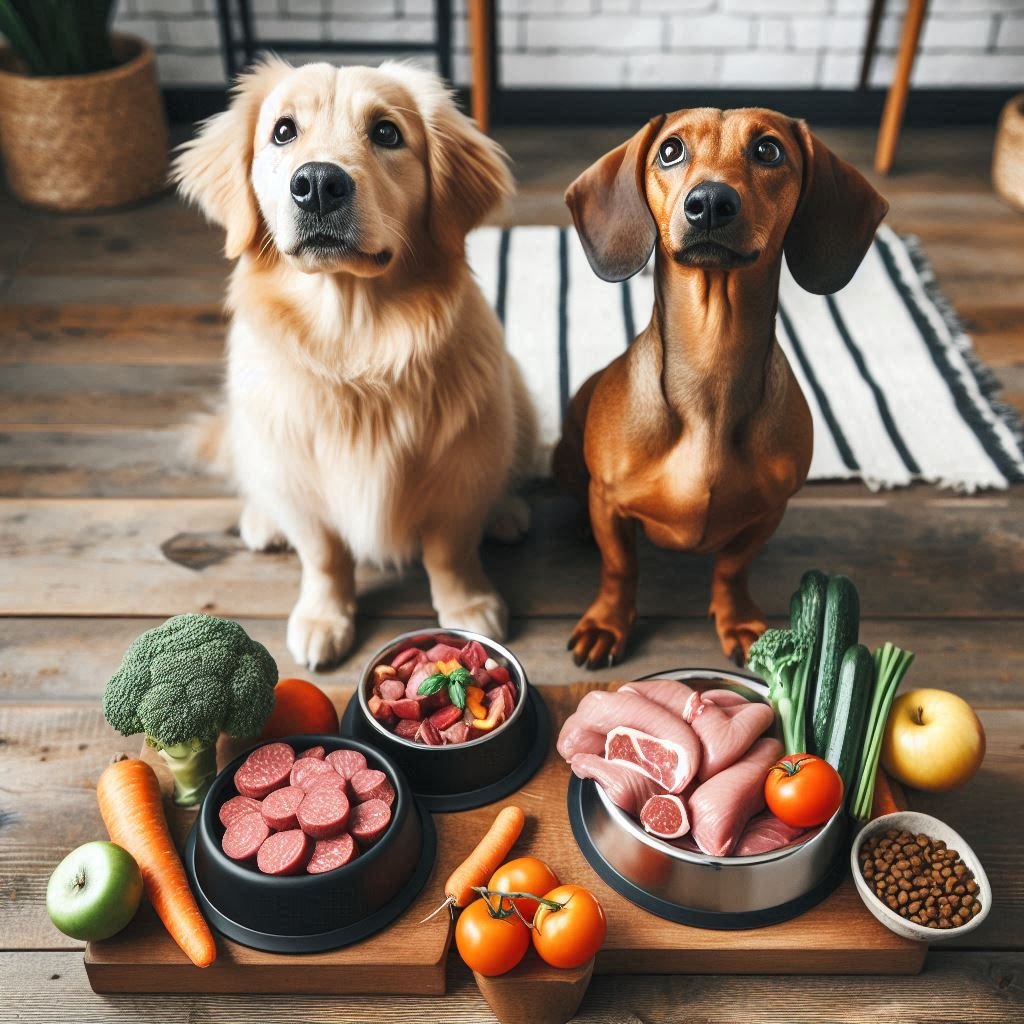Consider shifting your dog to a raw diet and have questions like “Does raw feeding make a dog aggressive?” or “Are raw feed and dog aggression even related in any capacity?”
I’m a clinical veterinarian with over five years of experience. In this article, I’ll share all the essential information to identify if your dog is being aggressive, what might be causing this behavior, how to deal with it, and if raw dog food has any role in it. With my expertise, you can trust that you’re getting the most reliable and up-to-date information.
Let’s break down the answers to your questions into a series of manageable steps. This will help you grasp the information more effectively and take the next steps in the right direction!
What is Aggressiveness in Dogs?
Understanding dog aggression can be complex. It can refer to various behaviors intended to intimidate or harm another animal or human. It may be displayed to avoid the further escalation of conflict, to displace another individual or group, or to cause physical or emotional harm to another individual. You’re not alone in navigating this issue.
Aggression consists of behaviors that usually begin with warnings and can culminate in an attack. There is a specific pattern behind a dog who shows consistent aggression towards other dogs and humans:
- Avoid eye contact by squinting and turning the head or body away from others.
- Yawning or licking of the lips.
- Pinning its ears tightly to the head.
- Crouching, lowering the body, and tucking the tail under the body.
- Becoming very still and rigid
- Guttural bark that sounds threatening
- Repeated bites in rapid succession
- Bite and shake
Aggression in dogs usually stems from fear, possessiveness, or a drive to dominate. While aggression is everyday canine communication, unacceptable aggression that causes injury must be addressed. Seeking assistance at the first signs of a problem is crucial to prevent such behaviors from becoming a norm.

Does Raw Food Make Dogs Aggressive?
The clear and straightforward answer to the question “Does raw food make dogs aggressive?” is No. Raw feed and dog aggression have no connection whatsoever in any capacity. This debate is an unfortunate result of a myth, circulating for years, that tasting blood would make dogs aggressive – but this is not factually true.
Raw food tends to cause the opposite change in a dog’s behavior. It makes dogs calmer by regulating their insulin levels. Raw food contains natural and organic contents that regulate hyperactivity and other behavioral disorders.
Secondly, raw food diets are typically personalized according to a dog’s nutritional needs, which can also help reduce aggression.
A raw diet will significantly improve your dog’s mental health. A study done in 2018 found that microbial communities vary significantly between raw-fed and kibble-fed dogs, with raw-fed dogs having higher diversity, which is what is seen in healthy beings. We also know that a healthy gut microbiome positively influences mental health because of the gut-brain axis.
Another comprehensive study revealed that aggressiveness in dogs might be linked with excessive dried gullets (also called tracheas) in locally available cheap dry meals for dogs.
These dried gullets can cause “Hyperthyroidism” in dogs, resulting in weight loss, aggressiveness, tachycardia, panting, and restlessness.
As a raw-feeding pet parent, you must inquire about what goes into your pet’s meals. If you’re buying budget minces, you’re likely getting trachea, which might be the root of this issue.
What Makes a Dog Aggressive?
Now that we have established that raw food has no connection with aggression in dogs, let’s examine some of the factors that actually impact their social behavior and learn why dogs behave aggressively.
Genetic, environmental, and situational factors can cause dog aggression.
Here are some key contributors:
- Genetics and Breed
Some breeds are predisposed to aggressive behaviors due to their genetic makeup and original purposes (e.g., guarding or protection). However, individual temperament varies widely within breeds.
- Lack of Socialization
Dogs that seldom go outdoors and don’t see new people often may react fearfully or aggressively to unfamiliar people, animals, or situations. Early and continuous socialization is crucial for a well-adjusted dog.
- Fear and Anxiety
Fear is a common trigger for aggression. Dogs may become aggressive if they feel threatened or are in situations that cause anxiety. This could be due to past trauma, loud noises, or unfamiliar environments.
- Territorial Behavior
Dogs may become aggressive when outsiders invade their personal space, including their home, yard, or family members. This behavior is often heightened when the dog perceives an intruder or threat.
- Hormonal Influences
Due to hormonal influences, unneutered male dogs may exhibit higher levels of aggression, particularly toward other males. Neutering adult dogs can help reduce hormonally influenced aggression.
- Health Conditions
Dogs in pain or suffering from medical conditions may exhibit aggression to protect themselves from further discomfort. Conditions like arthritis, dental diseases, injuries, thyroid diseases, ear infections, or neurological issues can increase aggressiveness.
Identifying root causes is extremely important for addressing and modifying the behavior. Consulting with a veterinarian, a professional dog trainer or a canine behaviorist can help identify the specific triggers and develop a tailored plan to manage and reduce aggression.
How to Reduce Aggressiveness in Dogs?
Aggression is an instinct and cannot be removed entirely from some dogs. However, with the proper techniques and management from a dog behaviorist, aggressiveness can be reduced to a point where it isn’t threatening or causing pet owners sheer discomfort.
Some of the steps to reduce dog aggression include:
- Socialization
It includes gradually exposing your dog to different people, animals, and environments in a controlled and positive manner. Start with less challenging situations and slowly increase the difficulty level as your dog becomes more comfortable.
- Obedience Training
Teaching everyday commands such as (sit, stay, come, and leave) can help you manage your dog’s behavior in various situations. Consistent training reinforces your role as the leader and provides your dog with clear expectations.
- Physical and Mental Training
Give your dog enough mental and physical training to prevent excessive energy levels. Engage it with toys, puzzles, and interactive games to keep its mind active.
- Desensitization and Counter Conditioning
Slowly expose your dog to its aggression triggers at a distance and intensity it can handle without reacting. Then, reward it for not being aggressive and change its emotional response.
- Monitor and Adjust
Continuously monitor your dog’s progress and adjust your approach as needed. Be patient and consistent, as behavior modification can take time.
Remember, each dog is different. What works for one dog might not work for another. Professional guidance is often essential in effectively reducing aggressive behaviors, which is why regular vet visits are always advised.
Conclusion
In conclusion, the myth that raw feeding makes dogs aggressive is just that—a myth. Scientific evidence shows no correlation between raw diets and increased aggression. When done correctly, Raw feeding can contribute positively to your dog’s health and behavior. It can support your dog’s overall well-being, contributing to a calmer and happier pet.
Aggression in dogs stems from various factors unrelated to their diet. The real culprits include genetics, lack of socialization, fear, and medical conditions. If you’re considering a raw diet for your dog, rest assured that it won’t lead to aggressive behavior. Instead, address the actual causes and ensure your dog gets the training and care it needs. Always consult professionals to ensure the best care for your dog.
FAQs
Does Raw Meat Make Dogs Aggressive?
The clear and straightforward answer to this question is No. Raw meat and aggressiveness in dogs have no connection.
Does Raw Meat Make Pitbulls Aggressive?
Although pit bulls are naturally more aggressive than any other breed of dog, raw meat has nothing to do with it.


